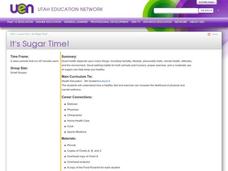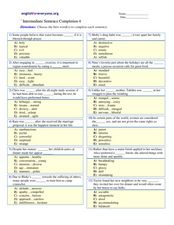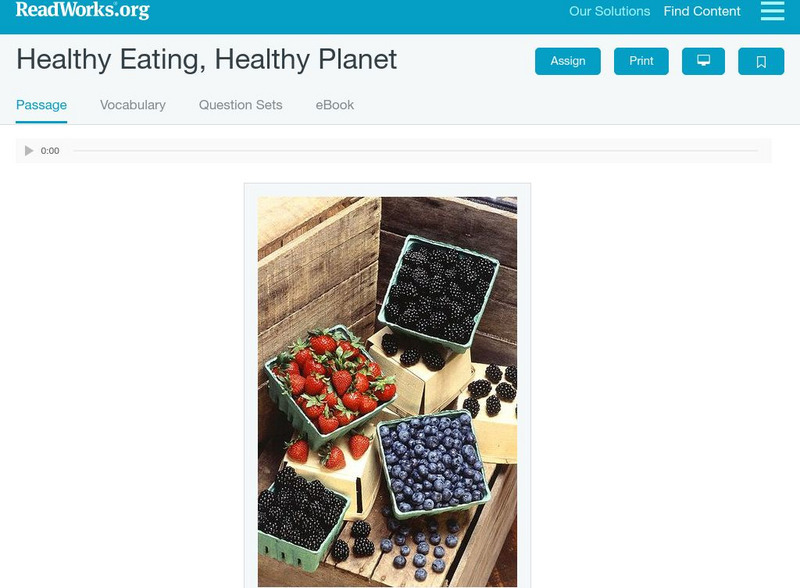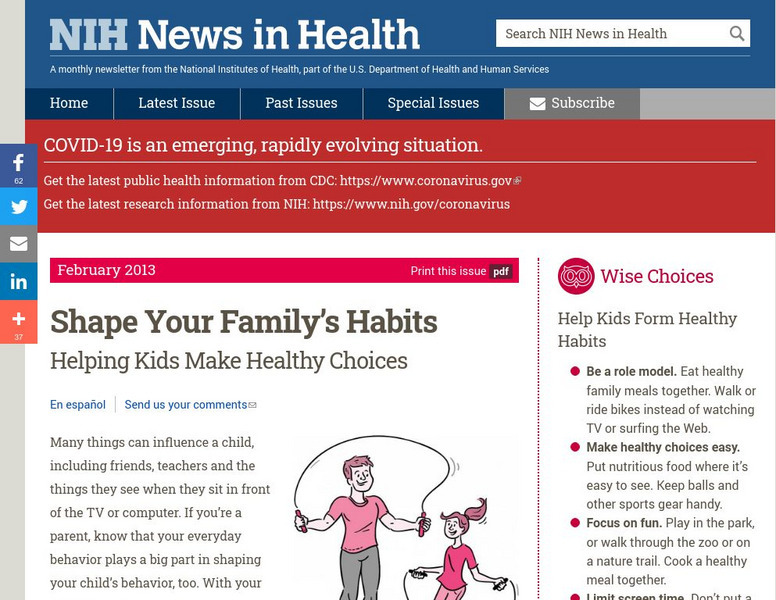Curated OER
Horticulture and Gardening
This answer sheet is made to be a companion to a Horticulture and Gardening worksheet. This could be used as a guide for activities in the classroom.
Curated OER
It's Sugar Time!
Fifth graders examine how good health depends upon many things, including heredity, lifestyle, personality traits, mental health, attitudes, and the environment.
Curated OER
Nutrition
First graders identify the Five Food Groups and the proper servings of each. They study the physical features of different foods such as fruits, and vegetables.
Curated OER
What Does Advertising Say About Smoking?
Students analyze the decision to smoke and how it is influenced by peer pressure. The discuss ways to say no to tobacco use.
Curated OER
Olympics
Students rotate through a variety of Olympic activities and record their results. Teams rotate through stations and practice units of measurement.
Curated OER
Fast Food Junkie
Fourth graders study their favorite fast food meal and analyze their nutritional value.
Curated OER
Healthy Snacks
Ninth graders examine teen attitudes towards snack food merchandising in schools and what contributes to successful food merchandising. The context for the lesson is found in the research conducted from the Health Canada Website.
Curated OER
Tiny Bites: What Difference Could They Make?
Students explore how small "extra" bites of food can add significant calories to their diet. They estimate how many extra calories they add to their diets by just taking small bites of food throughout the day.
Curated OER
Intermediate Sentence Completion 4
In this sentence completion worksheet, learners read the sentences and choose the best word to complete the sentence. Students complete 12 sentences.
Mayo Clinic
Mayo Clinic: Nutrition and Healthy Eating: Food Pyramids
Illustrated explanation of different types of pyramid-shaped healthy-eating plans.
Read Works
Read Works: Healthy Eating, Healthy Planet
[Free Registration/Login Required] An informational text about how changing our eating habits and food sources can positively impact our world. A question sheet is available to help students build skills in reading comprehension.
PBS
Pbs Teachers: Fat: Obesity, Eating Habits and Weight Loss
Evaluate current guidelines for a healthy diet, compare them to one's own eating habits and learn safe behaviors for maintaining a healthy weight. Analyze the food pyramid, fast-food and health-food nutrition and the causes of obesity.
PBS
Pbs Teachers: American Masters: Alice Waters: You Are What You Eat
Examine eating habits and determine how one can eat food that is healthier and tastier. Develop a proposal and multimedia presentation about improving the quality of food in the school.
National Institutes of Health
National Institute of Health: Shape Your Family's Habits
With family help, kids can learn to develop healthy eating and physical activity habits that last throughout their lives. This article looks at studies that prove the family's influence on kid's health is crucial, and tips to help kids...
Other
Classroom Connections: Wallace & Gromit Veggie Power
This downloadable teaching resource for Grades 2-3 has lessons on healthy eating designed to encourage children to eat more vegetables. Students explore their own and others' food preferences and learn about food groups.
Harvard University
Harvard School of Public Health: The Nutrition Source: What Should I Eat?
A lot of confusing and erroneous information exists regarding proper nutrition. Get the correct facts and improve your healthy eating knowledge here.
Curated OER
Kids Health: Children's Activities: Healthy Eating
You can create opportunities for learning about healthy food in many ways besides cooking and eating: you can use games, crafts, songs and dance. This site provides coloring sheets, flashcards, curriculum materials, nutritional games,...
Curated OER
Kids Health: Healthy Eating
Provides tips for implementing five of the best strategies to improve nutrition and encourage smart eating habits in toddlers to teens.
Government of Canada
Public Health Agency: Healthy Living
Videos, reports and interactive media help readers learn how to live a more healthy life.
Other
Kidnetic: Move and Eat Healthy
Choose from healthy activities to healthy eating tips at Kidnetic.com, where kids and parents are welcome.
PBS
Pbs Learning Media: Lesson 1: Where Are the Soda Trees?
Using film clips from In Defense of Food and a team activity, young scholars explore healthy eating habits. Students get excited about becoming food defenders and begin learning how to differentiate between food (whole and minimally...
Other
Cspi: The Need for Nutrition Labeling at Fast Food Restaurants [Pdf]
This 34-page document discusses obesity, nutrition labeling, the average American diet, the nutritional quality of foods from restaurants, and ways poor eating, obesity, cardiovascular disease, and premature death can be fought. Chapters...
Alabama Learning Exchange
Alex: What's on Your Plate?
In today's fast food world, it can be hard to make healthy eating choices. In this lesson, students will learn how they can incorporate healthy eating habits in their daily routines. They will use menus from local restaurant chains and...
Sesame Street
Sesame Street: Healthy Habits for Life
This comprehensive resource will give you the tools you need to teach children about eating right and being physically active so that they can establish healthy habits for life. Included are easy-to-use, fun lessons and activities that...




















